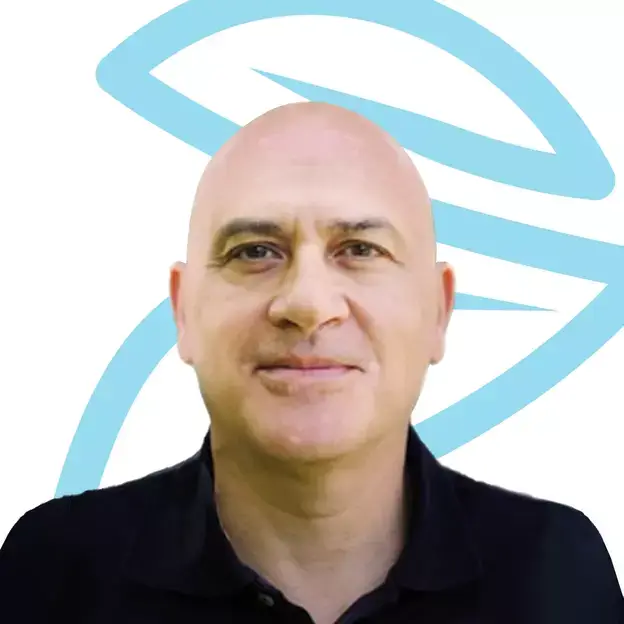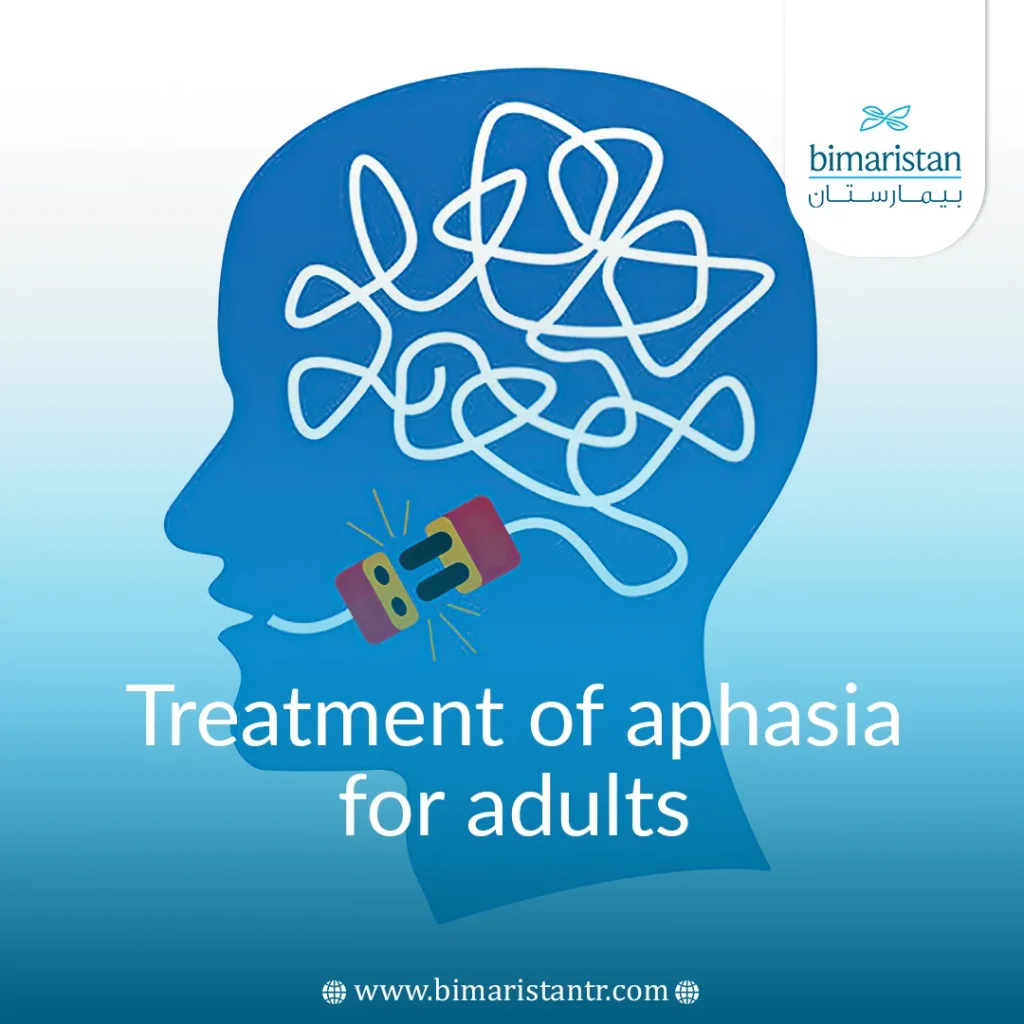Aphasia of speech in adults causes difficulty in speaking and understanding language properly, which significantly impacts the affected person’s social life. Turkey offers the possibility of treating aphasia in adults.
What is aphasia?
It is defined as a person’s inability to properly express what he wants to say or finds it difficult to understand the words he hears, in addition to a weak ability to read or write.
A speech disorder occurs as a result of the impact of the brain centers responsible for speech and communication, whether the cause is due to a severe traumatic injury to the head or a sudden stroke.
It has been classified into several types according to the symptoms observed. The patient may understand what is said to him but find it difficult to express what he wants (expressive aphasia), or he may be able to express well but does not understand what others say (receptive aphasia).
It is a common complication in the elderly after a stroke, and it may be seen in children and young people after a severe traumatic head accident that affects the brain.
Treatment for adults depends on managing the cause that leads to it as a first step. Then, the affected person undergoes lengthy treatment sessions under the supervision of specialists in this field to regain the ability to speak and pronounce correctly.
Aphasia causes in adults
The most common in adults is a stroke, which affects the perfusion of the speech and language centers in the brain, leading to damage and death of brain cells in that area. Read more about stroke in the elderly.
Severe head injuries that affect the linguistic areas of the brain also cause problems with speech and pronunciation, and the degree of damage depends on the nature of the accident.
Degenerative brain diseases in the elderly, such as Alzheimer’s disease, are considered one of the important causes in adults, as they develop gradually in affected patients.
There are other, less common causes, such as the presence of a brain tumor pressing on the speech areas of the brain or brain injury due to an infectious infection.
Cerebral aneurysms may cause it in addition to surgeries performed on the brain. Epilepsy and migraines are also classified among the causes, which are often temporary in these cases (in the form of seizures).
Aphasia types
Doctors classify adults into several groups according to symptoms and the patient’s ability to communicate, where language fluency and the ability to understand heard speech are evaluated.
There are three main types:
Expressive aphasia (Broca’s aphasia)
In this type, there is a loss of the patient’s ability to express what he wants to say, but he is able to understand what is said to him well; that is, the affected person is able to understand but is unable to speak in a clear, intelligible language.
Receptive aphasia (Frenca’s aphasia)
In this type, the opposite of what happens in Broca’s aphasia occurs, as the patient faces more difficulty in understanding what he hears than in the ability to speak intelligibly. That is, the patient does not suffer from major difficulties in the process of speaking, but rather the difficulty is in understanding.
Global aphasia
This type is considered the most severe type of aphasia that affects a person’s ability to speak with others, as the affected person has problems understanding audible speech in addition to a weak ability to speak in a correct linguistic manner. That is, the affected person is exposed to both Broca’s and Frencca’s symptoms.
Aphasia symptoms in adults
Aphasia symptoms vary depending on the severity of the injury and the type of aphasia that the patient suffers from. We mention the most important symptoms of aphasia for adults:
- Speaking incomprehensible phrases or incoherent sentences
- Speak slowly or stutter and use short sentences
- Replacing words with others that have no meaning in the context of the conversation
- Not understanding the words the injured person hears
- Writing incomplete, incomprehensible sentences
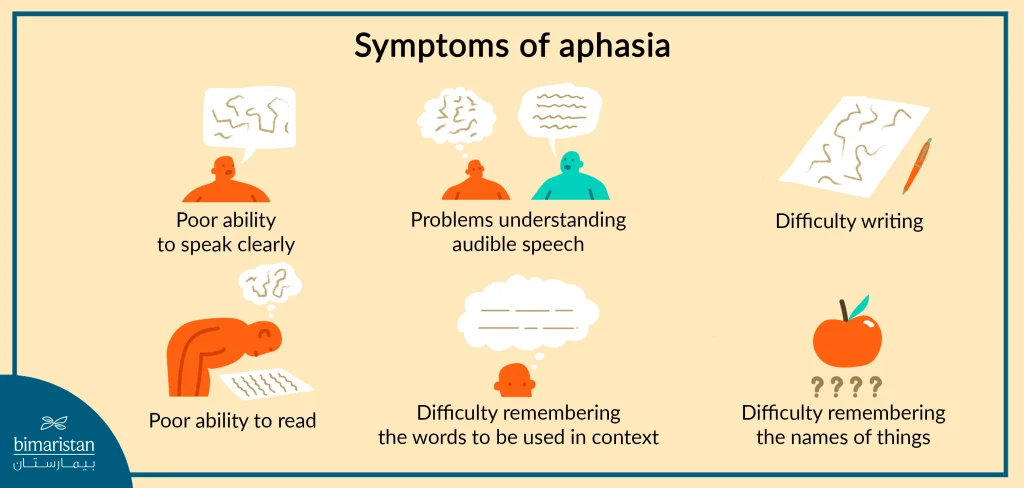
Aphasia diagnosis
To diagnose it in adults, the doctor conducts a comprehensive clinical examination and checks nerve function. In addition, the possibility of ordering imaging tests, such as a CT scan of the head, is also possible to rule out structural causes, such as brain tumors.
The doctor may resort to conducting a group of other tests, such as nerve imaging and listening to the pulse of the carotid artery in the neck, to rule out narrowing of the artery predisposing to a stroke.
In addition to the above, the speech-language pathologist conducts a comprehensive linguistic evaluation to determine the presence and type of aphasia and the extent of the person’s ability to understand and pronounce speech.
This evaluation includes conversing with the affected person, asking him several questions to evaluate his ability to understand and speak, and performing several linguistic exercises, such as asking the specialist to repeat some words or read and write sentences.
Aphasia treatment for adults in Turkey
Treatment depends on the nature of the damage occurring and the degree of damage to the affected brain area. It is possible, in some cases resulting from temporary causes such as epilepsy or migraine, for the aphasia to improve automatically with the passage of time.
Most people who suffer from this disease resulting from a stroke need rehabilitation sessions conducted by experts specialized in the field, and drug therapy may also be useful in managing it in adults.
The treatment methods are as follows:
Rehabilitation of language and speech problems by Speech Therapy
Recovering from speech problems and regaining the ability to speak and communicate normally takes some time, as the rehabilitation process is somewhat long and takes place over many sessions.
Language rehabilitation aims to improve people’s ability to speak and restore as much of their lost language as possible by having them speak in group therapy sessions with each other under the supervision of specialized experts or through individual therapy sessions with experts that include language exercises.
Rehabilitation sessions may include the use of special computers to assist with language therapy and learning verbs and word sounds.
The earlier speech therapy is started, the better the patient’s chances of improvement, so it is preferable to begin rehabilitation immediately after the injury occurs.
In Turkey, there are specialized centers for rehabilitating aphasia patients and treating speech problems. These centers are distinguished by providing the latest necessary equipment and medical staff with experience dealing with patients.
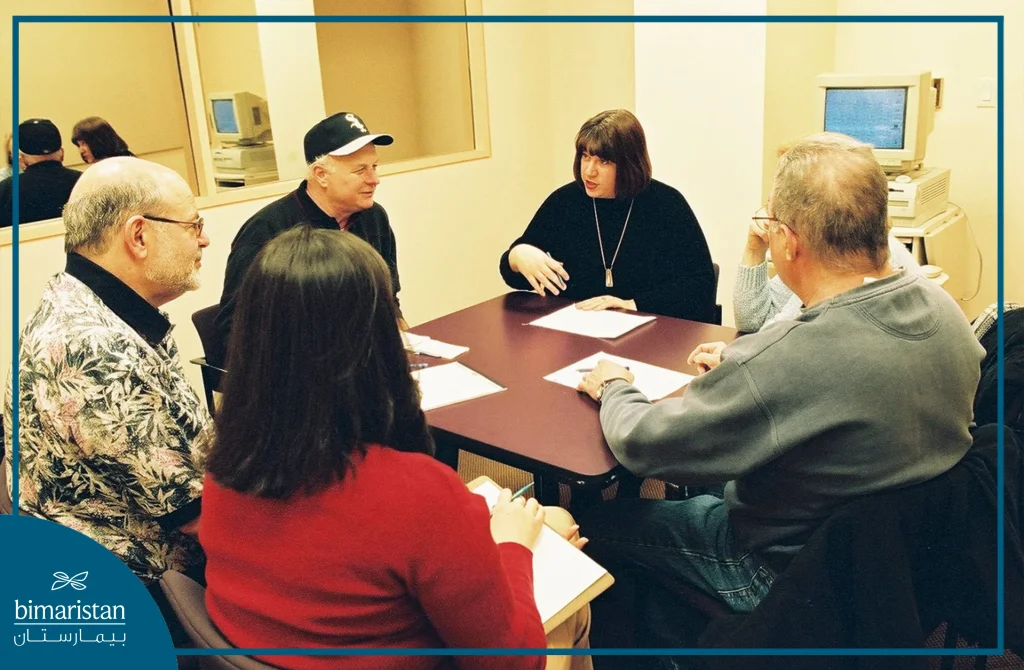
Pharmacological treatment of aphasia
Some studies are being conducted on the usefulness of using certain medications in treating this disease in adults. For example, it may be useful to use drugs that improve blood flow to the brain or that enhance the brain’s ability to recover faster and get rid of harmful chemical transmitters.
The effectiveness of these medications is still under study, and their benefit has not been proven.
Transcranial magnetic stimulation
One of the modern treatment techniques that can be useful in treating aphasia is that the affected brain areas are stimulated by precisely directing electromagnetic waves into the areas of the brain responsible for speech and language.
This method is considered minimally invasive, but its long-term effects have not yet been studied because it is one of the latest medical findings in treating aphasia.
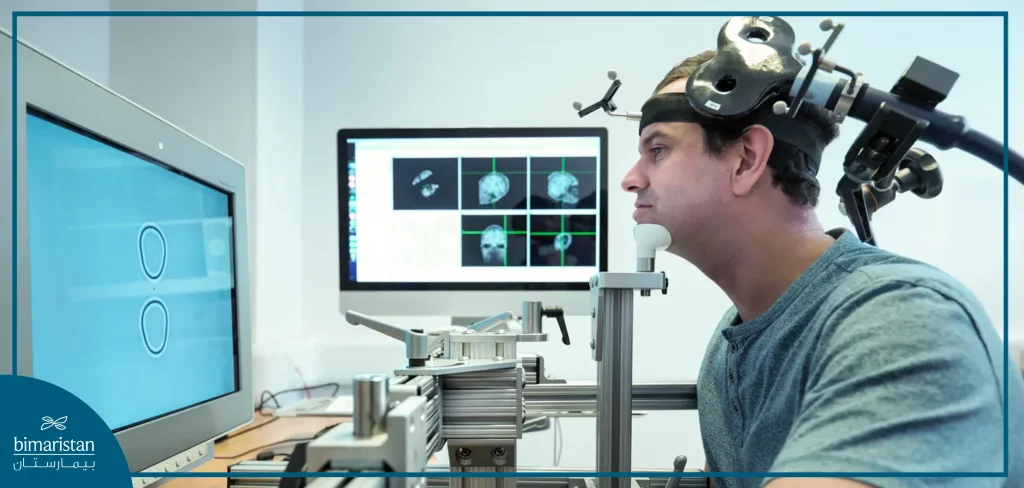
Aphasia complications
Aphasia has an impact on the quality of life and is considered a cause of many social problems, such as a tendency toward isolation and anxiety, in addition to depression, tension, and an unwillingness to speak and interact with others.
Prevention of aphasia
Aphasia in adults occurs unexpectedly, so it is not possible to prevent it because it occurs suddenly, but the causes that predispose to aphasia, such as stroke, can be prevented.
The risk of this disease can be reduced and prevented through the following:
- Follow a good diet and maintain a normal weight
- If you ride a bike, always wear a protective helmet to prevent head injuries
- Do not ignore infections that affect the eye or ear area, as they can spread to the brain and cause brain damage
- Doing exercise on a regular basis
- Stop smoking and avoid drinking alcohol
Sources:
Johns Hopkins
